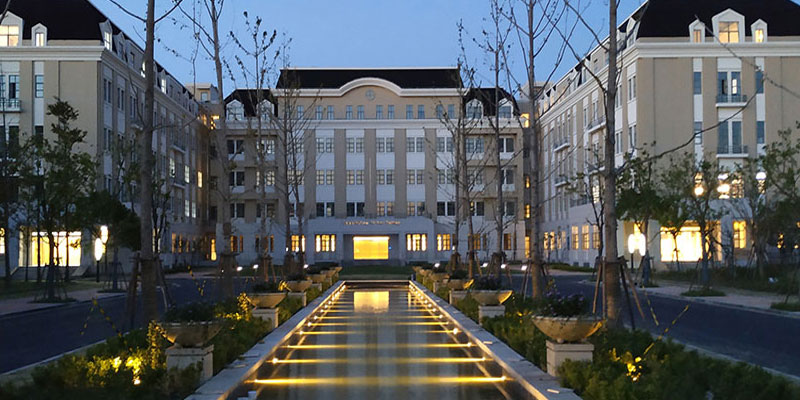学术报告
Embracing Blue for a Greener Future
本期主题:Embracing Blue for a Greener Future
主讲人:Prof. Catalina Spataru, Professor in Global Energy and Resources, Director of Energy Institute, Founder and Head of UCL Islands and Coastal Research Lab, University College London
邀请人:吕小静 副教授
时间:2024年5月27日(周一)10:00AM-11:00AM
地点:主楼4楼,A432教室
报告人简介
Catalina Spataru is Professor in Global Energy and Resources, the Director of the University  College London’s Energy Institute<https://www.ucl.ac.uk/bartlett/energy> and the Founder and Head of UCL Islands and Coastal Research Lab<https://www.islandscoastallab.com/> (ICR). Her interest is in how to tackle global challenges from electricity interconnections and market integration, to reliability, affordability and security of future energy systems and trade-offs needed to be made between energy and other resources (water, land, materials) through nexus research. To achieve a greater understanding of complex systems, Prof Spataru was leading interdisciplinary research through collaboration with academic and industrial partners across 27 countries, since joining UCL in 2010 she has been leading more than 24 research and industry funded projects. She is the author of 145 publications including 2 books as solo author, and 3 books as co-editor, papers, technical reports and policy briefs, and contributed to major international initiatives including World Energy Council scenarios Composing Energy futures to 2050, the Global Systems Science orientation paper part of EU-FET consultation process and so on. She has extensive experience on developing integrated toolboxes with mixed methods for assessing the resilience and adaptation to climate change (DR3 toolbox part of the Re-Energize DR3<https://www.govdisasters.com/> project funded by Belmont<https://www.belmontforum.org/archives/projects/re-energize-governance-of-disaster-risk-reduction-and-resilience-for-sustainable-development>), for climate adaptation and net zero for islands (ISLA UCL Islands Laboratory<https://www.islandslaboratory.com/>) on how green and blue economy models could support sustainability agenda, and how innovative solutions such as interconnected floating power systems could support the transition.
College London’s Energy Institute<https://www.ucl.ac.uk/bartlett/energy> and the Founder and Head of UCL Islands and Coastal Research Lab<https://www.islandscoastallab.com/> (ICR). Her interest is in how to tackle global challenges from electricity interconnections and market integration, to reliability, affordability and security of future energy systems and trade-offs needed to be made between energy and other resources (water, land, materials) through nexus research. To achieve a greater understanding of complex systems, Prof Spataru was leading interdisciplinary research through collaboration with academic and industrial partners across 27 countries, since joining UCL in 2010 she has been leading more than 24 research and industry funded projects. She is the author of 145 publications including 2 books as solo author, and 3 books as co-editor, papers, technical reports and policy briefs, and contributed to major international initiatives including World Energy Council scenarios Composing Energy futures to 2050, the Global Systems Science orientation paper part of EU-FET consultation process and so on. She has extensive experience on developing integrated toolboxes with mixed methods for assessing the resilience and adaptation to climate change (DR3 toolbox part of the Re-Energize DR3<https://www.govdisasters.com/> project funded by Belmont<https://www.belmontforum.org/archives/projects/re-energize-governance-of-disaster-risk-reduction-and-resilience-for-sustainable-development>), for climate adaptation and net zero for islands (ISLA UCL Islands Laboratory<https://www.islandslaboratory.com/>) on how green and blue economy models could support sustainability agenda, and how innovative solutions such as interconnected floating power systems could support the transition.
报告摘要
The number of challenges our societies have to address on land and ocean is often overwhelming. Climate change, energy provision, sea level rise and impact on coastal areas, transition to a ‘green’ economy that is low in carbon, will require changes to energy systems, but given the complex dynamics and interactions, the optimal technology mix is uncertain. Policies are increasingly evolving to address cross-cutting issues across sectors and stakeholders, within different networks and levels. To address these challenges requires to develop tools that facilitate dialogue and better understand trade-offs between sectors, resource use, the impact of coupling different types of systems with different behaviour dynamics. This will help design better policies and more efficient provision of public services. This talk highlights the importance of a “green-blue” economy, offering a plethora of opportunities for sustainable development and economic growth across various sectors (energy, shipping and port facilities, fisheries, etc) advocating for a holistic approach that integrates circular economy into policy decisions. By considering the interplay of diverse technologies such as renewables, storage, hydrogen production, biogas, energy efficiency measures, floating power systems, alongside innovative business models, we can better understand trade-offs between resource use at different scales and enhance resilience to climate change. A wider combination and deployment of technologies together with relevant business models could enable greater resilience to climate change and meeting net zero, but would require much support than existing and announced policies.





 友情链接 ---
友情链接 ---